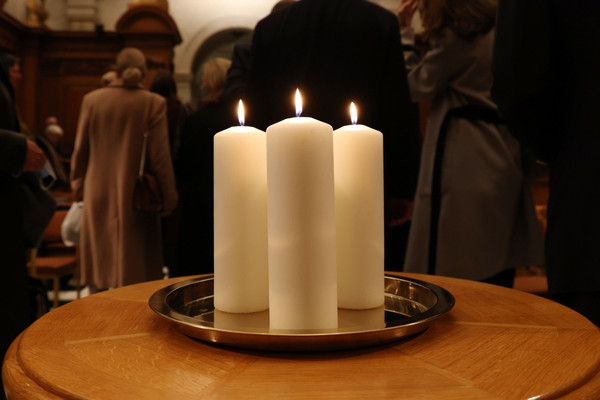NEWS

Valiant for Truth – Journalists’ Service review
Written by Vadim Goss, journalist & this year’s Guild of St Bride Journalism Bursary holder
Listen to the recording of the service and view transcripts
137. The number kept being recalled like a painful memory. 137. The number of journalists killed in Gaza over the past year. And over the past year, the Committee to Protect Journalists (CPJ) has recorded the highest death toll of journalists since it was founded in 1981 and well over the 100 or so killed last year.
“Events like this have never been more important,” said St Bride’s rector, the Revd Canon Dr Alison Joyce, prefacing the solemnity of the evening. Not for one moment did it cease.
As journalists, there exists a pretence that they are simply mediators navigating the story from sources to reader. They insist that this line of work forces them to distance themselves from their subjects — developing an impersonality of sorts, and that remaining so is the key to unlocking the truth.
In truth, they insist upon this pretence because it protects them from the most important and perilous part of the job: the fidelity to humanity. This requires, inexorably, an intimacy with fellow humans — a risk which always has the potential to compromise personal safety.
We were reminded that every journalist killed, or detained, or persecuted, paid and are paying the ultimate price for upholding their fidelity.
Yet instead of anger, the service carried benevolence for the fallen. They were honoured, through music, through heartfelt speech, through candlelight. It was powerful. It was moving. And yet it cultivated one simple and overriding definition to the atmosphere. St Bride’s was at full capacity, yet it was absence that we felt. They were not there. The church became a cenotaph.
Esme Wren, editor-in-chief of Channel 4 News, spoke first, reading Psalm 46. The Psalms, typically idiomatic, were not so in Wren’s delivery. All its meaning came from the context. For God, He who has the power to end all wars, can only do so if He is in our hearts — that is, only if He is “with us” can “refuge” be found, according to 46.
To decode Wren’s choice of Psalm was to understand that the conflicts in Israel, Russia, and beyond, can be stopped, alongside the needless loss of life, if God returns to the hearts of men. Wren transported Psalm 46 into poignance.
The second speech was by Jodie Ginsberg, CEO of CPJ, who acted as a surrogate for the words of Shrouq Al Alia, whose husband Roshdi Saraj was killed in an Israeli airstrike in Gaza. Alia’s words marked the impotency the international community has shown in protecting the press: “As journalists, we are tired, and disappointed,” the speech concluded. Ginsberg chose this speech, I think, to instruct
us not to fall into apathy. That we must find a way to revitalise Alia.
The third speech consisted of words written by Kim Sengupta, read aloud by Caroline Gammell, assistant editor of The Independent. Sengupta was one of the only British journalists present during the fall of Kabul in 2021. The speech was haunting, absorbing, fissuring the stained glass and the idols and forcing us to be witnesses.
Three years later, save from the occasional update about another oppressive measure imposed on the country’s women, the Taliban’s recapture of Afghanistan has largely disappeared from the news cycle. Sengupta’s speech, therefore, was also a supplication to not turn our eyes away — or, rather, to reopen them.
Lastly, Roula Khalaf, editor of the Financial Times, delivered the keynote address. 137. Once again the number rang out. Khalaf then added some more figures and facts about the past year: 47 journalists in the Middle East have been injured, 71 arrested, 2 are missing. In Ukraine, 20 journalists have been arrested by Russia. This is happening all over — from Hong Kong to Nigeria to India, she explained.
“We live in a world in which still, too often, powers see the traditional press as the enemy that gets in the way of their alternative facts.”
Throughout her address, Khalaf upheld The Washington Post’s ethos, “democracy dies in darkness” — a slogan they adopted shortly after Trump first assumed office. And now, in 2024, we are once again
met with an administration who sees the traditional press (or, as they would say, “the mainstream media” — a phrase invented by Goebbels, Hitler’s propaganda chief) as the enemy.
The FT editor reinforced the central message of the service, the high stakes that all journalists face for high standards of reporting the truth. The only time for mourning, sadly, was this night. For as Khalaf said, “journalists press on.”
Posted On: Thursday 28th November, 2024
READ OR LISTEN TO OTHER SERVICES

STAY UP TO DATE
WITH NEWS FROM ST BRIDE’S
Subscribe to our newsletter to receive alerts for
events and advance information about seasonal services.
We protect your data and never overwhelm your inbox.
SUBSCRIBE